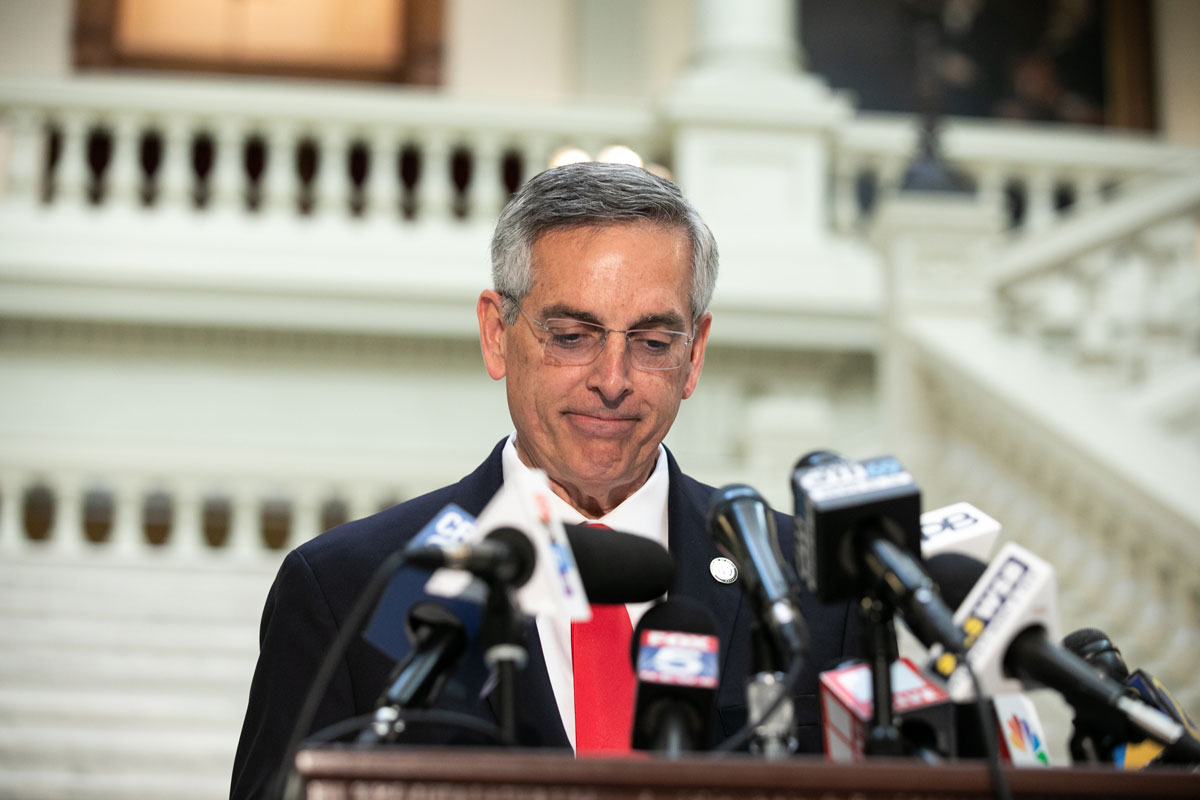
Photograph by Jessica McGowan/Getty Images
One of the latest hairpin turns in the rollercoaster ride that is Georgia’s dual Senate runoff race took place this past weekend when the outgoing president of the United States spent an hour on the phone with Georgia Secretary of State Brad Raffensperger, regurgitating conspiracy theories and exhorting the state’s top election official to “find” enough votes to overturn the November election. That call now has been heard around the world, following the recording’s release to the Washington Post and AJC.
The call has been the true Kraken released during the post-election efforts by President Trump and his allies to undo his election defeat. The legality of pressuring a state official to change the outcome of a thrice-counted vote is something for constitutional scholars and criminal experts to debate.
Meanwhile, Trump supporters have griped that it was Raffensperger who crossed a line by recording his own phone call. Senator David Perdue, battling for a runoff victory, called the recording “disgusting” in a Fox News interview.
But, as any Georgia journalist, divorce lawyer, or corporate whistleblower can tell you, it was totally legal for Raffensperger to record his own conversation.
Georgia—like a majority of the states—has a “single-party consent” law when it comes to recording conversations. What this means is that one person on a call can record the conversation without the agreement of the other.
This can be used to protect journalists who conduct phone interviews. (As a part-time journalism professor, I always instruct students that the ethical thing to do is be transparent about recording, but it’s not required.)
Recording your own calls and conversations can be used to protect yourself in legal proceedings. One member of a feuding couple can record a heated conversation with their other half and submit it as evidence in divorce or custody hearings, for example. If you’re discussing pay or benefits with your boss, you can record the call to document what’s promised to you.
“The law allows a person to record someone else asking them to do something illegal, or threatening them in some way, which could be useful as evidence,” says Jess B. Johnson, trial attorney and partner in Pate, Johnson & Church.
There can be a “gray area” if you call from a state with single-party consent to a state, like California, that requires both parties to consent to a call, says Johnson. It’s advisable to check out the laws if you are placing a call between states, as often the law of the state with the strictest rules will apply.
However, in the case of the call between the White House and the Georgia Secretary of State’s office, there was not any issue, as the District of Columbia also has single-party law.
Raffensperger reportedly dodged 18 attempted calls from Trump before, like an aggrieved soul dealing with a jilted ex, he took the president’s call. He’d been burned before when Senator Lindsey Graham called him to dispute the results in Georgia. Graham denied the call. So this time, members of his office were ready to hit record when Trump dialed in. Even so, they held onto the recording until Trump gave his own—and differing—version of their conversation on Twitter.
Being able to release recordings that hold the powerful accountable or shed light on possible abuses of power is one of the civic values of a single-party consent law. In 2019, a proposed change in the law was sparked by the fallout from just such a case. Casey Cagle, who had been running for the 2018 GOP gubernatorial nomination was tanked in part by a call released by former contender Clay Tippins, who recorded a conversation in which Cagle said he’d support “bad public policy” for political expediency. Cagle lost the nomination—clinched by a then Trump-supported Brian Kemp. Allies of Cagle’s in the next legislative session attempted to get the law changed. The attempt failed.
Having the law allows average citizens and public figures alike to protect themselves and document disputes or misdeeds. When the dust settles from the Trump controversy, it’s likely some will take up the cause of changing Georgia’s law again.
“There is no need to change laws that are not broken. Making it more difficult for law-abiding people to record conversations could have a chilling effect on the public’s right to know,” says Jim Zachary, president-emeritus of the Georgia First Amendment Foundation and CNHI’s director of newsroom training and development. “Changing the law could also embolden wrong-doers and make it far more difficult for a person—for instance an investigative journalist—to expose wrong-doing.”
Update: We added a section to this story about making calls from a single-party consent state to a state that requires both parties to consent to a call.














